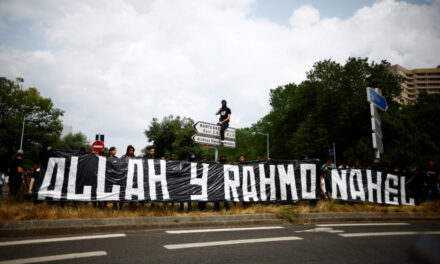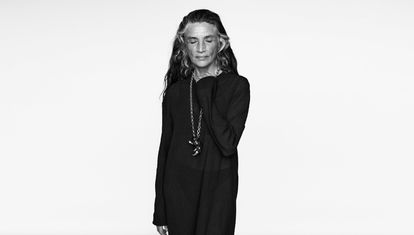Growing up, Fitriya Mohamed loved sports, especially basketball.
But after playing the game in school, she struggled to find tournaments and leagues where she could fit in as a Muslim girl around her Toronto home.
Frustrated by the lack of diversity and space, she decided to start a basketball league for Muslim women and alies, with the hope of pushing the rates of participation.
“Representation is truly so important,” the founder and executive director of Muslim Women’s Basketball League said in an interview with Olympics.com from her home in Toronto, as she prepares for the second edition of the event starting in August 2023.
“I realised that with more visibility we have in spaces, more young Muslim girls are coming to play basketball.”
Mohamed’s idea has become a huge success, as it’s making her favourite sport more inclusive and forging a path for a new generation of women and girls in Toronto and beyond, to shoot hoops.
“I wish I had this when I was playing because it would have inspired me to go further. So now seeing that that young girl that’s participating in a league every summer is so great…and she’s surrounded by a community that’s so supportive of her now, which is so great.”
Fitriya Mohamed on Muslim women in sports ‘a minority within a minority’
After moving from Ethiopia when she was 10, Mohamed was happy to find a community in the Canadian city that encouraged her to be active. Having never practised sport, she was thrilled to join and enjoy some of the events on offer.
She particularly loved football and basketball, which made her mother uncomfortable, as she had not seen a lot of girls practising sport in their East African home.
It was not the only hurdle Mohamed had to deal with.
Playing was a struggle – from finding modest competition wear, and even seeing other women in the team sports who looked like her.
“When I was playing basketball, I didn’t have the proper sport hijab. It was difficult to find the proper athletic attire that fit within my needs,” recalled Mohamed, who was named the Female Athlete of the Year, the first Muslim woman to win it, for her high school.
“I wanted to play basketball in college but I didn’t get there. I wasn’t able to see others that look like me in these spaces, unfortunately. Again, I’m the first generation of my family to pursue university as well, and I didn’t have that belief when I was transitioning to university with my basketball career.”
Fitriya Mohamed, founder of the Muslim Women Summer Basketball League.
(Trevor Lang)
Mohamed kept on playing recreational basketball as she pursued her degree in sport management.
During this period there was increased women’s participation in sport generally, but still very few Black women, or hijab wearing girls, on the basketball courts.
“Muslim women have been left out from so many conversations and from so many opportunities because of people’s lack understanding of what Islam actually permits Muslim women to do,” the 26-year-old said.
Several federations reviewed the uniform policies that allowed for Muslim women to compete and practice sport.
Sporting apparels manufacturers also designed and made pro hijabs for athletes widely available, but her sport remained still largely inaccessible to young Muslim girls.
There was something else preventing them from playing sport.
“The uniform was such a big issue, and obviously it’s not just Muslim women that want to dress modest and play sport. But it was like, when a Muslim woman or minority asks for this type of thing, that became a big deal.”
“But we also wanted to be in these spaces and doing it in the way we feel comfortable, being able to step out of a meeting room when it’s prayer time to pray.”
Fitirya Mohamed on facilitating the inclusion of Muslim girls in sport
Around the same time, there was a push and change of perception amongst the Muslim community in the Greater Toronto Area that was encouraging girls’ involvement in sport.
Her involvement with Hijabi Ballers, a network of women keen on increasing the representation of Muslim females in sports spaces in Toronto, and celebrating their athleticism, also inspired her to establish a platform that would focus on her passion.
“I created a little space for Muslim women to pursue basketball while also embracing their Islamic identity,” said the basketball enthusiast, adding that her idea to form the league was also shaped by other female athletes who made waves playing with the headscarf.
They include Batouly Camara, An Guinean-American who played in the NCAA collegiate competition, and made an impact as one of the first Muslim pro players to wear the hijab during games, and Bilqis Abdul-Qaadir, who in 2018 fought the International Basketball Federation’s ruling against women with the head covering.
The Olympic dream of the “Ice Princess in a hijab”
Mohamed launched the Muslim Women Summer Basketball League in 2020, but it didn’t take off until last year due to the Covid-19 pandemic.
“What I wanted to achieve with this basketball league was a tournament where Muslim girls and women from around the world would come to Toronto to participate in this two-day tournament. So, last March, we did our first annual Hijabi Ballers, and we had 12 teams registered,” the master’s student shared with Olympics.com.
Her focus of study is on creating space for Muslim women in academia, while researching on hijab-wearing Muslim athletes involved in advocacy and activism.
Back to the league, it’s mainly targeting Canada for now, but she has a bigger goal that would also focus on her native home.
“One of the things I want to do with the league is also to go into different parts of Africa, starting with Ethiopia, just being born there. Because obviously the challenges we experience here are not comparable to what girls and women in Africa experience, as the culture and the tradition is different.”
The response to the league and the basketball clinics has been overwhelming.
“For example, there’s this 15-year-old, she’s very talented for her age, and I’m super excited to see where she goes to with this and her mum is so supportive,” Mohamed said of one of the participants at the Summer League that in 2023 will be split to two categories – recreative and competitive.
“She’s being invested into and surrounded by a very supportive group. The empowerment…that’s something that I never had, and talking to different girls who are older, they are like, ‘I wish I had this when I was playing at college level because It would have inspired me to go further’.”
With the league up and running, she now hopes the focus can shift on the athleticism and talent coming from the league and not on their playing kits.
“It’s just a matter of giving us the space and the opportunity, and we will prove that we have the prowess.”
The 2023 Summer League will be held from July 9 to August 27, 2023 at the Waterfront Neighbourhood Centre in Toronto, Canada.



